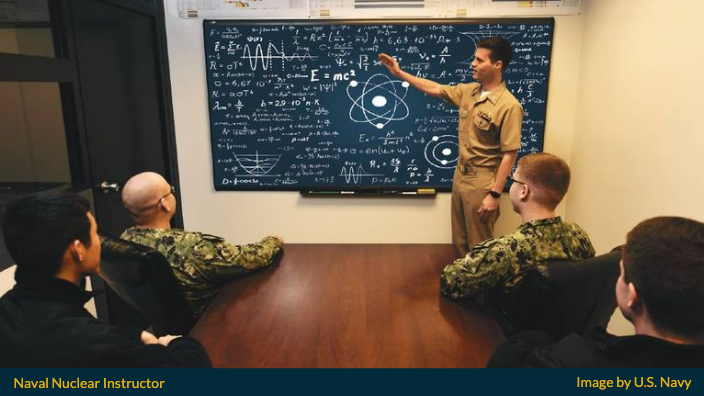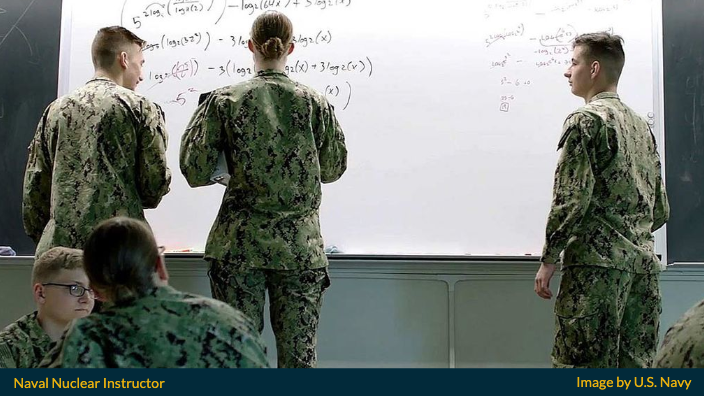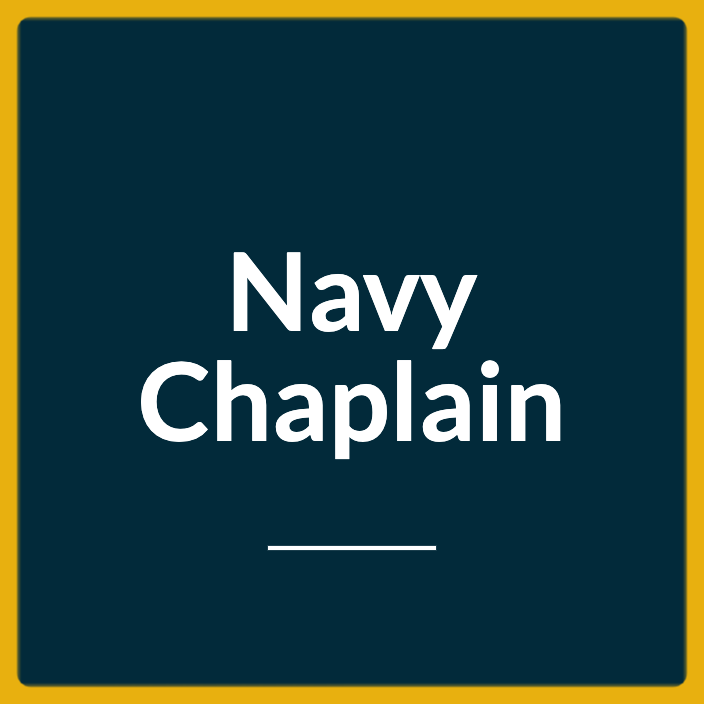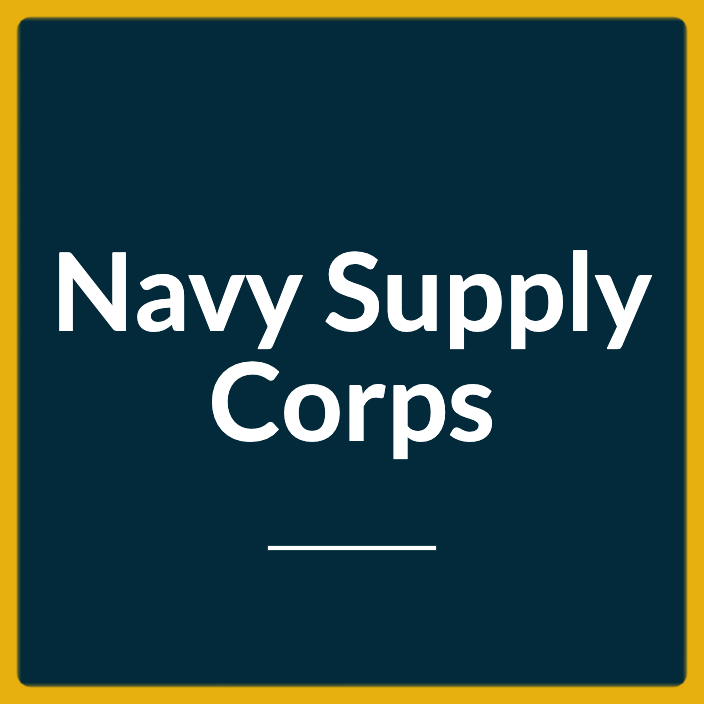Last Updated on March 4, 2024
This guide provides useful information that will help with your decision to become a Naval Nuclear Instructor during Fiscal Year 2024.
Naval Nuclear Instructors are Restricted Line Officers in the Navy who educate officers and enlisted personnel on the theories and foundations behind the design and operation of Navy nuclear reactors and power facilities. They have the option to become a Nuclear Power School Instructor or Nuclear Power Training Unit Instructor. The Navy Officer designator code for Nuclear Instructor is 1210.
As you will see, this program is very specialized and reserved for our country’s top talents, especially in the STEM fields.
Let us get right to it.
Topics Covered
- Nuclear Power School Instructor
- Nuclear Power Training Unit Instructor
- Education Opportunities
- Post-Service Opportunities
- How to Become a Naval Nuclear Instructor
- More Information
Nuclear Power School Instructor

To be a Nuclear Power School (NPS) Instructor, you must be at the top of your class and have a thorough grasp of nuclear power.
You oversee not just delivering the information, but also the mentality.
Your students will sustain the world’s longest record of safe nuclear operations.
They will power our whole defensive force, and they will require the skills and preparedness that you provide.
Navy Nuclear Instructors are the mentors who help the next generation get to the starting line.
Specific Responsibilities
Nuclear Power School Instructors instruct officers and enlisted staff in the theories and principles of designing and operating Navy nuclear reactors and power plants. These instructors are critical in training service members for jobs in the fast-paced and competitive nuclear power sector.
The Naval Nuclear Power School is a 24-week course of instruction in science, technology, and nuclear power plant operations aimed at teaching theoretical foundation understanding of nuclear power.
Among the topics covered in class are:
- Physics, Calculus, Algebra, and Chemistry
- Fluid Dynamics and Heat Transfer
- Theory of Reactors
- Electrical and Mechanical and System Design
- Health Physics and Radiological Controls
What to Expect
You will work in an academic setting for up to five years at Naval Nuclear Power School (NNPS) in Charleston, SC, where you will compress four years of sophisticated math, science, and theory regarding highly secret nuclear technology into a single year.
Eventually, you will teach and facilitate the same collaborative learning environment that every nuclear-trained officer and enlisted Sailor gets.
You will educate, coach, and lead students through a tough course of instruction, both inside and beyond the classroom in this demanding setting.
Nuclear Power Training Unit Instructor
Nuclear Power Training Unit (NPTU) instructors lead and supervise a watch team that operates one of the world’s most active nuclear power reactors.
Following completion of the comprehensive Nuclear Propulsion training pipeline, these highly qualified instructors guarantee that all fleet personnel of the Navy’s Nuclear Program acquire the necessary hands-on training, allowing for a smooth transition to the fleet.
Those who become NPTU Instructors get essential operational and supervisory expertise with world-class nuclear, mechanical, electrical, and instrumentation systems.
Specific Responsibilities
While running a nuclear reactor, NPTU instructors give hands-on instruction and direct supervision to nuclear-trained officers and enlisted personnel.
They are critical in maintaining the safe operation of shore-based nuclear power facilities as well as in preparing officers and enlisted men for careers in the nuclear power sector.
The Nuclear Power Training Unit is a 26-week course of instruction that focuses on applying knowledge of nuclear power plant operations to become a certified nuclear operator.
Areas of core instruction include:
- Reactor safety systems
- Reactor start-up, steady-state operations, and shutdown
- Maintenance review and approval
- Chemistry analysis and control
- Casualty response
What to Expect
Working in the NPTU in Charleston, South Carolina, you will be in a unique atmosphere that combines classroom instruction and self-paced study with real-world operations.
Much of your work will be done in the nuclear power plant of a moored submarine, which will provide you with significant hands-on experience.
You will study the same curriculum as Submarine and Surface Warfare Officers and then teach it, facilitating the same collaborative learning atmosphere that you initially encountered during your own training.
This job needs devoted leaders who are committed to the success of their pupils.

Education Opportunities
Current undergrad students who satisfy the required background will get paid while finishing school through the Nuclear Propulsion Officer Candidate (NUPOC) program, besides receiving best-in-class training at innovative facilities.
Students majoring in mathematics, engineering, physics, and chemistry may be given priority to admission to the program.
If you are accepted into the NUPOC program as an aspiring Naval Nuclear Instructor, you will be able to:
- Earn a salary of more than $4,000 per month for up to 30 months before graduating from college.
- Enjoy military health-care benefits while enrolled in the program.
Interested applicants should contact a local officer recruiter to explore all options.
Post-Service Opportunities
What regularly distinguishes people with Nuclear Navy experience is a concentrated brain with the capacity to be creative.
They display unwavering dedication to answering questions that others find inexplicable and leadership – whatever the task, whatever the shape.
The United States Navy promotes the development of people with intellect, character, and drive, and then channels that knowledge into real-world applications.
Their technical and leadership skills are well-developed.
After completing an initial four to five-year commitment, you might use your essential expertise to seek prestigious leadership, research, teaching, and consulting roles in the Navy.
Alternatively, you might pursue any of the other options available to former nuclear officers in the civilian market, which admittedly may be more financially lucrative.
How to Become a Naval Nuclear Instructor
To become a Naval Nuclear Instructor, applicants must be American citizens 19 to 29 years old at the time of commissioning, with at least a bachelor’s degree in a qualifying technical field and a highly competitive grade point average (GPA).
Applicants must also have satisfactorily completed specific calculus-based courses to qualify.

Navy Nuclear Propulsion is a doorway to industry leadership and lifelong learning for qualified college graduates. Breakthrough research and high-level civilian participation.
Work that stretches well beyond the military to have an influence on the rest of the world.
All the above is available to current undergraduate students who satisfy the required background, particularly those pursuing chosen areas such as mathematics, engineering, physics, or chemistry.
And after you graduate, you will enjoy a career as a recognized professional and Naval Officer with one of the world’s most successful nuclear programs.
Following the initial courses will provide you with an advanced education and expedited hands-on experience that you will find nowhere else.
The specifics listed below are current as of May 2019, per the Navy Personnel Command. No updates have been issued so far.
Naval Nuclear Instructor Basic Eligibility
| Citizenship | Applicants must be United States citizens. |
| Age | Applicants must be at least 19 years old and under 29 years old at the time of commissioning. Waivers may be considered on a case-by-case basis for individuals who will be under the age of 31 at the time of commissioning. |
| Gender | This program has no gender restrictions. |
| Marital Status | This program has no marital status restrictions. |
| Physical | Under the Restricted Line criteria established in Chapter 15 of the Medical Department Manual. Prior to commissioning as a nuclear officer, program participants must satisfy the medical criteria for nuclear field duty/ionizing radiation. |
| Education | Candidates must be college graduates or students seeking a BS or MS degree from an accredited college or university in the United States or a United States territory (majoring in engineering, mathematics, chemistry, physics, or other technical areas). Those still in school may apply as early as their junior year of college, and must have: Completed one academic year of college-level calculus Completed one academic year of college-level calculus-based physics Earned a competitive GPA and a minimum grade of “B” in all technical courses |
Also Read: Navy OCS Guide for Officer Applicants
The entire time spent as an undergraduate is defined as “curriculum” for the purposes of assessing eligibility.
The month and year of the first bachelor’s degree is regarded as the curriculum’s completion date.
To support the indicated graduation date, all candidates must present a degree completion plan.
Without the express consent of OPNAV N133, candidates may not extend their expected time in college, stop attending classes, move institutions, take part in exchange programs, or change majors.
Involvement in a co-op or work studies program after acceptance into the Nuclear Instructor program is typically not permitted if such participation would cause a delay in the graduation date established at the time of acceptance.
Waivers are handled individually.
NUPOC Interview
All students who apply to the Navy Nuclear Propulsion Officer Candidate (NUPOC) program are subjected to a stringent screening procedure before being chosen for a personal interview with the Director of Naval Reactors in Washington, D.C.
The first portion of the interview involves technical questions from calculus, physics, and other technical disciplines.
The bulk of the questions are from calculus and physics, but you may be questioned about other areas in your major as well.
This section of the interview usually lasts 30–40 minutes and includes two to four key questions every session.
The second round of the interview procedure included meeting with the Admiral in charge of the Naval Nuclear Propulsion program.
During this interview, the Admiral will go through your transcripts and technical interview assessments, as well as analyze your communication skills, interests, and enthusiasm for the program.
All potential Nuclear Officers are hand-picked by the Admiral.
VIP Tour
If you are a qualifying Nuclear Propulsion Officer candidate, the Navy provides a two-day VIP excursion to immerse you in this environment.
You will get the chance to explore the flight deck of an aircraft carrier or the torpedo chamber of a submarine. Interact with and question existing and potential Officers.
You will also learn about the Navy’s long history and its nuclear program.
This is your opportunity to see firsthand what it is like to start your career as a Nuclear Officer in the Navy.
Service Obligation
The service obligation for Nuclear Instructors is five years in Active-Duty status upon commissioning. Eight years is the required service for all Naval Officers.
Hence, the remaining three years of service may be performed in the Selected Reserve or Ready Reserve.
More Information
If you want more information about becoming a Navy Nuclear Instructor, the next logical step is to contact a Naval Officer Recruiter.
Find out how you can benefit from becoming a Nuclear Instructor—or if it is even the right career move for you.
You may also be interested to read:
Hope you find this helpful to your career planning.


